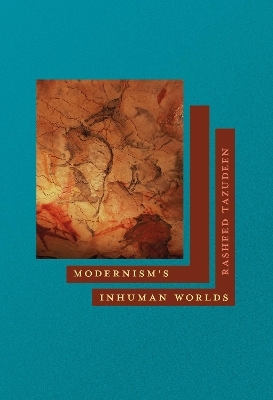
Modernism's Inhuman Worlds
Seiten
2024
Cornell University Press (Verlag)
978-1-5017-7649-6 (ISBN)
Cornell University Press (Verlag)
978-1-5017-7649-6 (ISBN)
Modernism's Inhuman Worlds explores the centrality of ecological precarity, species indeterminacy, planetary change, and the specter of extinction to modernist and contemporary metamodernist literatures. Modernist ecologies, Rasheed Tazudeen argues, emerge in response to the enigma of how to imagine inhuman being—including soils, forests, oceans, and the earth itself—through languages and epistemologies that have only ever been humanist. How might (meta)modernist aesthetics help us to imagine (with) inhuman worlds, including the worlds still to be made on the other side of mass extinction?
Through innovative readings of canonical and emergent modernist and metamodernist works, Tazudeen theorizes inhuman modernism as a call toward further receptivity to the worlds, beings, and relations that tend to go unthought within Western humanist epistemologies. Modernist engagements with the figures of enigma, riddle, and metaphor, according to the book's central argument, offer a means toward what Franz Kafka calls an "otherwise" speaking, based on language's obliqueness to inhuman and planetary being. Drawing on ecocriticism, decolonial and feminist science studies, postcolonial theory, inhuman geography, and sound studies, Tazudeen analyzes an inhuman modernist lineage—spanning from Darwin, Carroll, and Flaubert, through Joyce, Kafka, and Woolf, to contemporary poetic works—as both part of a collaborative rethinking of modernism's planetary and inhuman aesthetics, as well as occasions for imagining new modes of livingness for the extinctions to come.
Through innovative readings of canonical and emergent modernist and metamodernist works, Tazudeen theorizes inhuman modernism as a call toward further receptivity to the worlds, beings, and relations that tend to go unthought within Western humanist epistemologies. Modernist engagements with the figures of enigma, riddle, and metaphor, according to the book's central argument, offer a means toward what Franz Kafka calls an "otherwise" speaking, based on language's obliqueness to inhuman and planetary being. Drawing on ecocriticism, decolonial and feminist science studies, postcolonial theory, inhuman geography, and sound studies, Tazudeen analyzes an inhuman modernist lineage—spanning from Darwin, Carroll, and Flaubert, through Joyce, Kafka, and Woolf, to contemporary poetic works—as both part of a collaborative rethinking of modernism's planetary and inhuman aesthetics, as well as occasions for imagining new modes of livingness for the extinctions to come.
Rasheed Tazudeen is Lecturer in English at Yale University.
| Erscheinungsdatum | 04.07.2024 |
|---|---|
| Zusatzinfo | 8 Halftones, black and white |
| Verlagsort | Ithaca |
| Sprache | englisch |
| Maße | 152 x 229 mm |
| Gewicht | 907 g |
| Themenwelt | Geisteswissenschaften ► Philosophie |
| Geisteswissenschaften ► Sprach- / Literaturwissenschaft ► Anglistik / Amerikanistik | |
| Geisteswissenschaften ► Sprach- / Literaturwissenschaft ► Literaturwissenschaft | |
| Naturwissenschaften | |
| ISBN-10 | 1-5017-7649-5 / 1501776495 |
| ISBN-13 | 978-1-5017-7649-6 / 9781501776496 |
| Zustand | Neuware |
| Haben Sie eine Frage zum Produkt? |
Mehr entdecken
aus dem Bereich
aus dem Bereich
Poetik eines sozialen Urteils
Buch | Hardcover (2023)
De Gruyter (Verlag)
CHF 83,90
Entzauberung und Faszination des Immergleichen in Literatur und Film
Buch | Softcover (2024)
Springer Fachmedien Wiesbaden GmbH (Verlag)
CHF 118,95
Buch | Softcover (2024)
belleville (Verlag)
CHF 27,95


